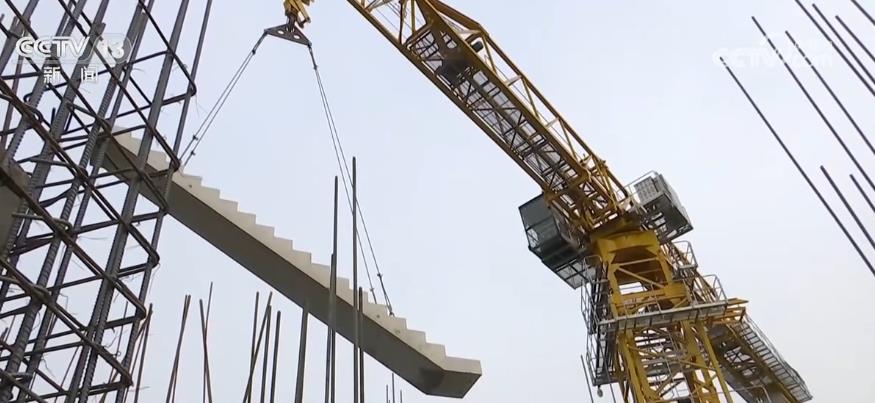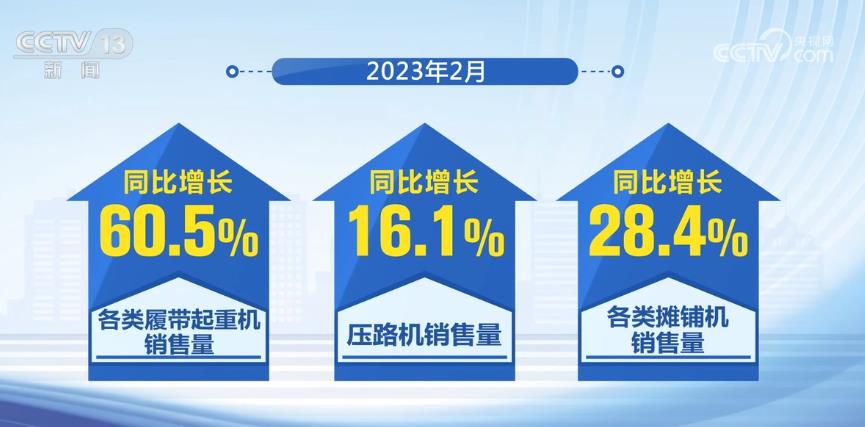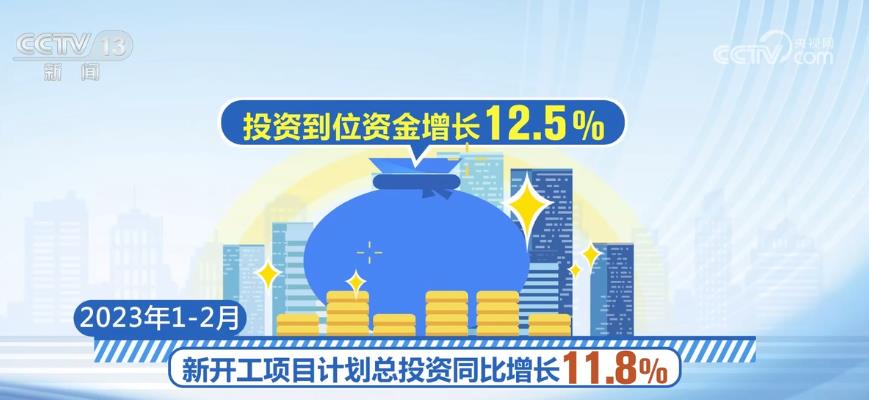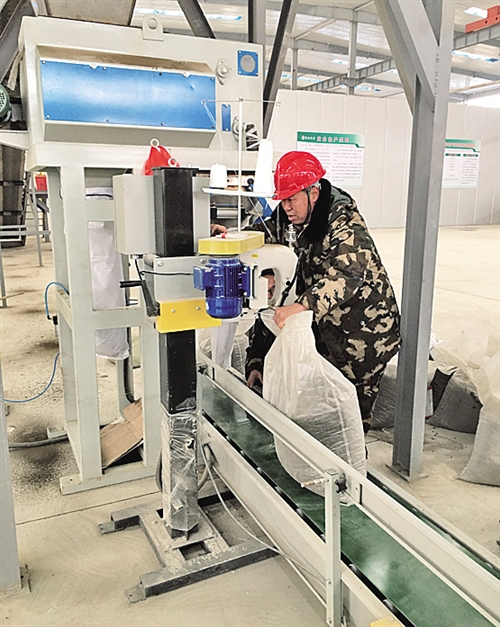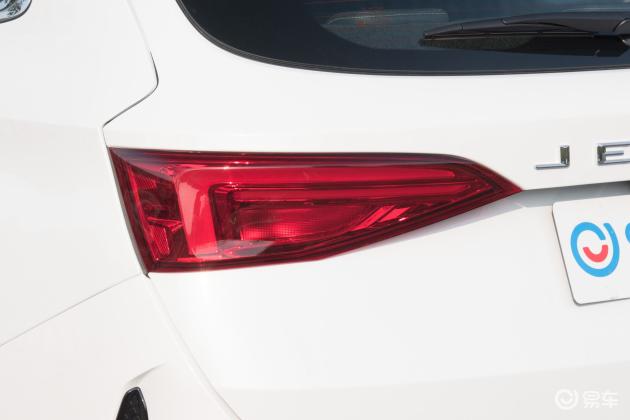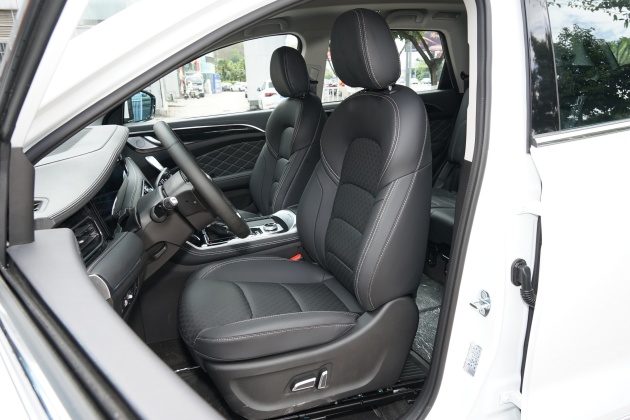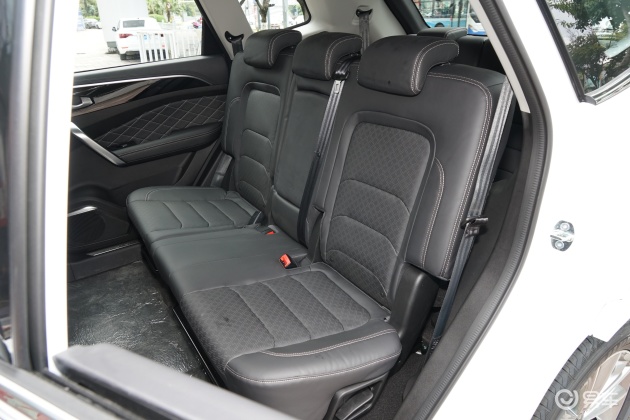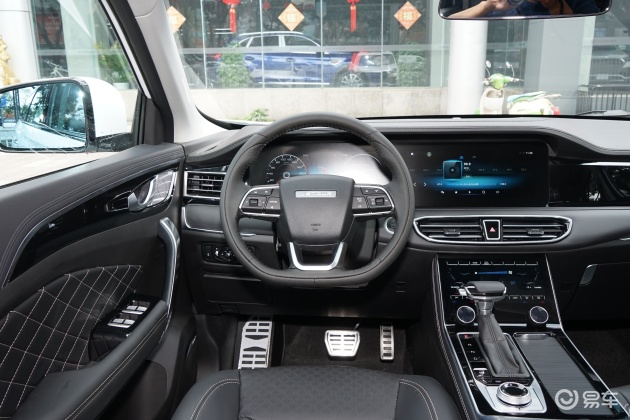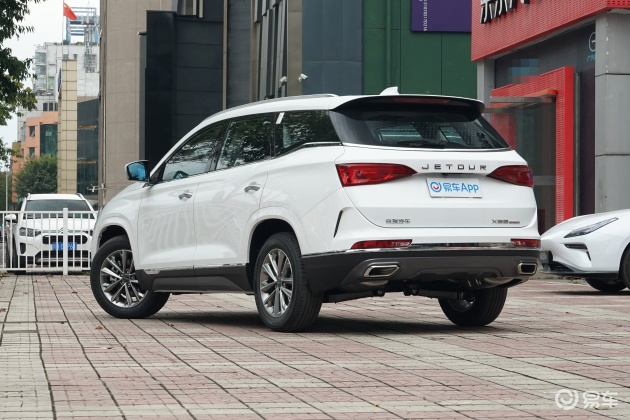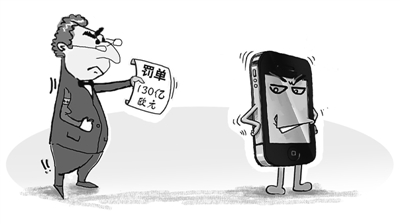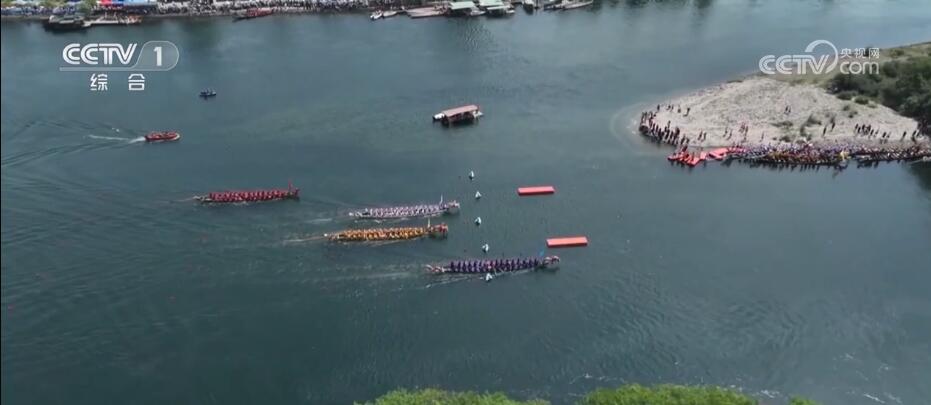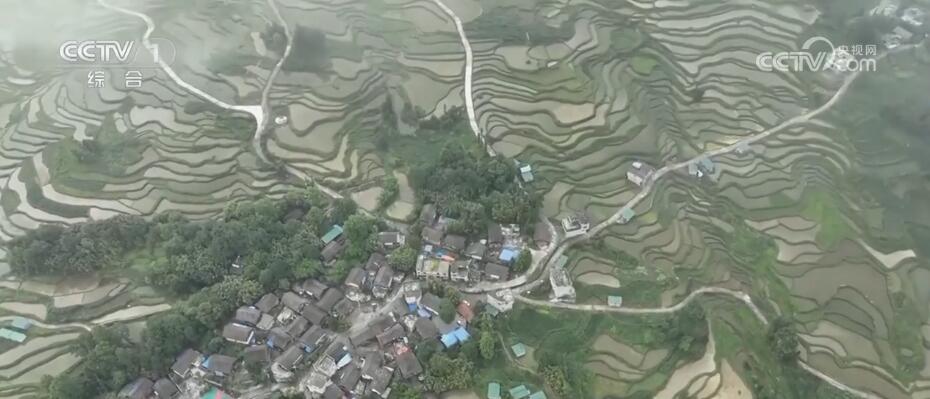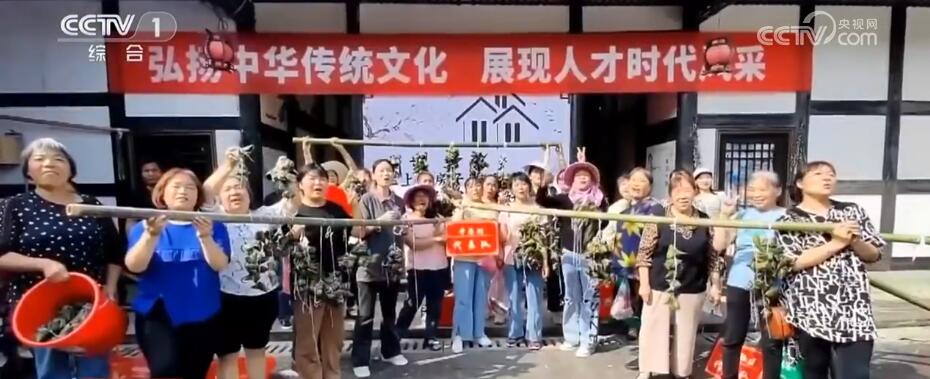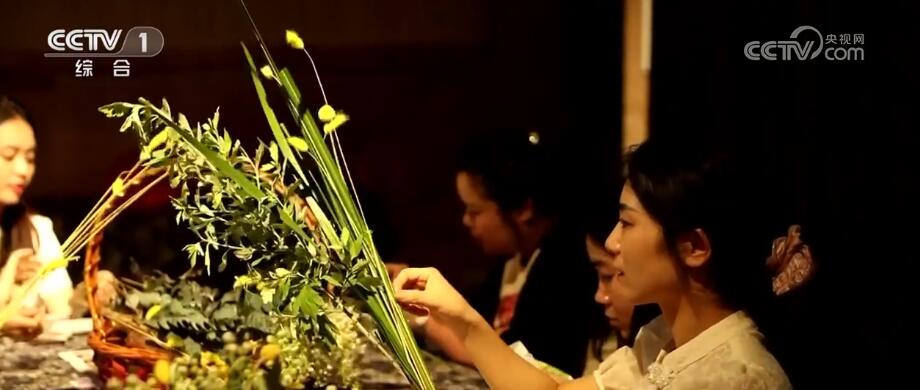More news is in the "Donggang Release" video number.
On September 25,
Shandong Provincial Department of Commerce and other 7 departments
Release on printing and distributing Shandong Province in 2024
Notice of the detailed rules for the implementation of automobile replacement and renewal subsidies
↓↓↓
The "Detailed Rules" propose that for the transfer of used passenger cars and the purchase of fuel passenger cars, the subsidy for each car with a car purchase price of less than 80,000 yuan (inclusive) is 3,000 yuan, the subsidy for each car with a price of 80,000 yuan (exclusive) to 200,000 yuan (inclusive) is 8,000 yuan, and the subsidy for each car with a price of more than 200,000 yuan (exclusive) is 12,000 yuan;
For the transfer of old passenger cars and the purchase of new energy passenger cars, the subsidy is 4,000 yuan for each car with a car price of less than 80,000 yuan (inclusive), 10,000 yuan for each car with a price of 80,000 yuan (inclusive) to 200,000 yuan (inclusive), and 15,000 yuan for each car with a price of more than 200,000 yuan (inclusive).
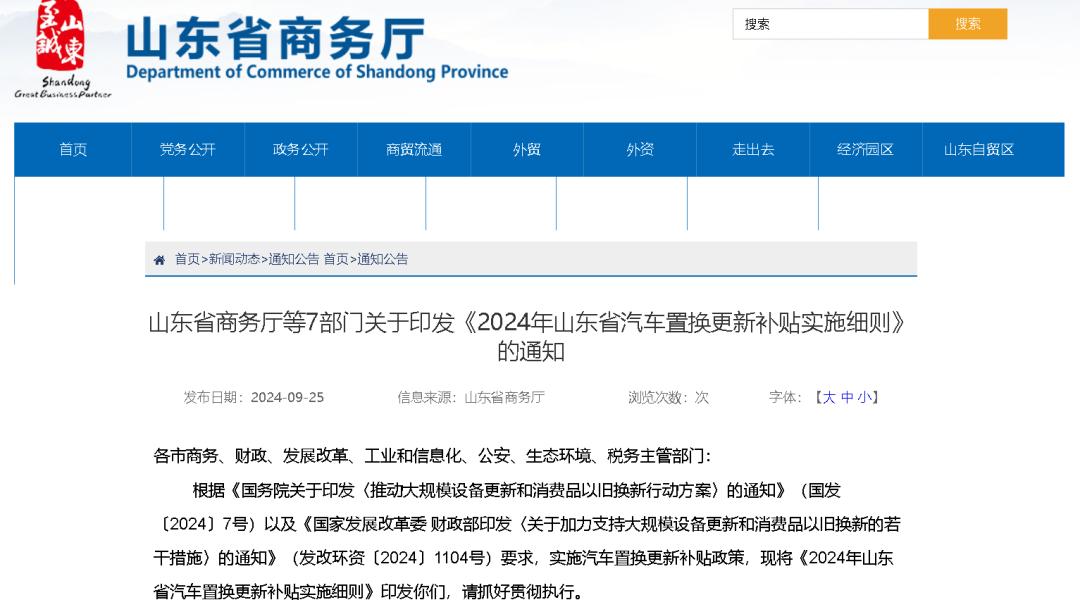
Notice of Shandong Provincial Department of Commerce and other 7 departments on printing and distributing the Detailed Rules for the Implementation of Automobile Replacement and Renewal Subsidies in Shandong Province in 2024
Municipal departments in charge of commerce, finance, development and reform, industry and information technology, public security, ecological environment and taxation:
According to the requirements of the Notice of the State Council on Printing and Distributing the Action Plan for Promoting Large-scale Equipment Renewal and Consumer Goods Trade-in (Guo Fa [2024] No.7) and the Notice of the Ministry of Finance of the National Development and Reform Commission on Printing and Distributing Several Measures for Supporting Large-scale Equipment Renewal and Consumer Goods Trade-in (Fa Gai Huan Zi [2024] No.1104), the subsidy policy for automobile replacement renewal will be implemented.
Shandong Provincial Department of Commerce
Shandong Provincial Department of Finance
Shandong Provincial Development and Reform Commission
Shandong Provincial Department of Industry and Information Technology
department of public security of shandong province
Shandong Provincial Department of Ecological Environment
State Taxation Administration of The People’s Republic of China Shandong Provincial Taxation Bureau
September 25, 2024
(This piece is publicly released)
Detailed Rules for the Implementation of Automobile Replacement and Renewal Subsidies in Shandong Province in 2024
In order to thoroughly implement the spirit of the Notice of the State Council on Printing and Distributing the Action Plan for Promoting Large-scale Equipment Renewal and Consumer Goods Trade-in (Guo Fa [2024] No.7) and the deployment arrangement of the Notice of the Ministry of Finance of the National Development and Reform Commission on Printing and Distributing Several Measures for Supporting Large-scale Equipment Renewal and Consumer Goods Trade-in (Fa Gai Huan Zi [2024] No.1104), the subsidy policy for automobile replacement and renewal will be better implemented.
I. Implementation Time
The implementation period of the policy starts from July 25, 2024 (the following dates include the same day) and ends on December 31, 2024 at the latest. During this period, after the municipalities have used up the funds allocated by the central and provincial governments, they will determine whether the subsidy policy will be implemented, and make an announcement in time.
Second, the scope and standards of subsidies
(1) If a consumer transfers a passenger car under his name from July 25th, 2024 to the deadline for the implementation of municipal policies, and purchases a new energy passenger car or a fuel passenger car (both new cars) in an automobile sales enterprise in Shandong Province, and completes the vehicle registration in Shandong Province, a one-time fixed subsidy will be given.
(two) the subsidy object is individual consumers. The consumer who transfers the old passenger car and the consumer who purchases the new passenger car must be the same person. Consumers can apply for a subsidy every time they transfer an old passenger car and buy a new one. There is no time sequence requirement for transferring old passenger cars and purchasing new passenger cars.
(3) For the transfer of used passenger cars and the purchase of fuel passenger cars, the subsidy is 3,000 yuan for each car with a car price of less than 80,000 yuan (inclusive), 8,000 yuan for each car with a price of 80,000 yuan (inclusive) to 200,000 yuan (inclusive), and 12,000 yuan for each car with a price of more than 200,000 yuan (inclusive); For the transfer of old passenger cars and the purchase of new energy passenger cars, the subsidy is 4,000 yuan for each car with a car price of less than 80,000 yuan (inclusive), 10,000 yuan for each car with a price of 80,000 yuan (inclusive) to 200,000 yuan (inclusive), and 15,000 yuan for each car with a price of more than 200,000 yuan (inclusive). The purchase price is subject to the total amount of price and tax in the unified invoice for motor vehicle sales.
(4) Passenger cars mentioned in these Detailed Rules refer to small and micro passenger cars with nine seats or less. Hanging new energy vehicle number plate is a new energy passenger car, and hanging other vehicle number plates is regarded as a fuel passenger car.
(5) The term "transfer" as mentioned in these Detailed Rules refers to that individual consumers obtain a valid Uniform Invoice for Second-hand Car Sales through sales, so that the ownership of used passenger cars under the applicant’s name is transferred (excluding changes) and the transfer registration procedures are completed. The transferred used passenger car shall be registered in the applicant’s name before July 25, 2024 (subject to the time recorded in the Motor Vehicle Registration Certificate), and the transfer time shall be subject to the time recorded in the Motor Vehicle Registration Certificate.
The time for purchasing a new passenger car is based on the issuance time of the Uniform Invoice for Motor Vehicle Sales, and the time for registration is based on the time recorded in the Motor Vehicle Driving License for the new passenger car.
(VI) During the implementation of the policy, applicants who purchase the same new passenger car (subject to the vehicle identification code and the uniform invoice for motor vehicle sales) shall not apply for the subsidy of national automobile trade-in or automobile replacement and renewal in Shandong Province repeatedly. Those who have applied for any of the above types of subsidies shall be deemed to have automatically waived their application for another type of subsidies. During the review of subsidy application information, the purchased new passenger car should always be registered in the applicant’s name, otherwise the review will not be passed.
Third, the subsidy declaration process
(1) Import of subsidy declaration
Individual consumers who intend to apply for automobile replacement and renewal subsidies should search for the "Shandong Automobile Replacement and Renewal" applet through WeChat and Alipay from September 28, 2024 to January 10, 2025, select the subsidy acceptance place according to the issuing place (municipal level) of the Uniform Invoice for Motor Vehicle Sales for the purchase of new passenger cars, fill in the information accurately according to the system prompts, and upload relevant supporting materials clearly and completely. If it fails, it will not be accepted.
(2) Subsidy application materials
1. Enter the identity information of the applicant and the mobile phone number under his name that can normally receive short messages, the card number of Class I debit card issued by the commercial bank in China held by the applicant, the name of the opening bank and other information, and upload photos or scanned copies of the front and back of the applicant’s ID card.
2. Enter the vehicle identification code (VIN code), license plate number, transfer registration date and other information of the transferred old passenger car, and upload the original photos or scanned copies of the Unified Invoice for Used Car Sales of the old passenger car and the Motor Vehicle Registration Certificate (pages 1 and 2) before the transfer.
3. Enter the vehicle identification code (VIN code), license plate number, purchase date and registration date of the new passenger car, and upload the original photos or scanned copies of the Uniform Invoice for Motor Vehicle Sales (the first invoice copy) and the Motor Vehicle Driving License (the main page and the secondary page) of the new passenger car.
The unified invoice for the sale of used cars, the unified invoice for the sale of motor vehicles and the motor vehicle driving license for the purchase of new passenger cars mentioned above shall be obtained from July 25, 2024 to the deadline for the implementation of municipal policies.
Fourth, the subsidy review and distribution process
(1) After the applicant submits the application information, the municipal commercial departments shall, jointly with the public security departments, conduct an audit in accordance with their functions and responsibilities, and feed back the audit results through the information platform of automobile replacement update. If there are difficulties or objections in online audit, the commercial department will conduct offline verification with relevant departments. Information review and subsidy payment can be carried out by the municipal commercial departments in conjunction with the financial departments to hire third-party institutions.
(two) the information submitted by the applicant is true, effective, clear and complete, and meets the subsidy conditions of these rules, and shall be examined and approved. If the information submitted by the applicant does not meet the subsidy conditions in these Detailed Rules, the commercial department will inform the applicant of the requirements for information correction at one time through feedback from the information platform, and the applicant shall submit the relevant information through the original channels before January 10, 2025 as required. If it fails to be accepted within the time limit, the subsidy will not be issued. If the applicant needs to submit relevant supplementary materials under special circumstances such as the change of name and ID number, the requirements of the municipal commercial departments shall prevail.
(3) The municipal commercial departments shall, jointly with the financial departments, conduct a preliminary examination of the subsidy application information according to their duties, and push the qualified information in the preliminary examination to the Provincial Department of Commerce and the Provincial Department of Finance. The Provincial Department of Commerce and the Provincial Department of Finance will hire a third-party agency to review the preliminary examination information and then feed it back to the municipalities, and the municipalities will allocate the subsidy funds to the personal bank account provided by the applicant according to the procedures. The municipal commercial departments shall, jointly with the financial departments, summarize the information and amount of subsidies once a month and report them to the Provincial Department of Commerce and the Provincial Department of Finance.
V. Subsidy fund management
Municipalities should make full use of the central and provincial capital quotas and speed up the examination of subsidy information and the issuance of funds. If the cities run out of funds allocated by the central and provincial governments, the excess will be supported by the relevant cities through local funds, and the central and provincial governments will no longer bear the burden. Municipalities’ commercial departments and financial departments shall, before January 31, 2025, submit the distribution of subsidy funds and capital settlement’s suggestions during the implementation of the policy to the Provincial Department of Commerce and the Provincial Department of Finance.
Six, supervision and management requirements
(a) the Provincial Department of Commerce, the Provincial Department of Finance, the Provincial Public Security Department, the Provincial Taxation Bureau and other departments shall, in accordance with the division of responsibilities, guide the relevant departments of various cities to supervise and manage the work of automobile replacement and renewal subsidies.
(two) the municipal people’s government is the first responsible subject of project and fund management, and the subsidy funds shall not be used for other purposes. Municipal commercial departments are responsible for subsidy information, capital expenditure progress, performance, safety and standardization; The municipal finance departments are responsible for the performance evaluation and supervision and inspection, and the dynamic monitoring of the whole process of performance operation should be strengthened in budget implementation, and the deviation of performance operation should be found and corrected in time; Municipal public security, taxation and other departments shall, according to their duties, do a good job in the transfer registration of old passenger cars, registration of new passenger cars, unified invoice management of motor vehicle sales and other related work, ensure the safety of funds, timely payment, and implement the subsidy policy.
(three) cities should set up a hotline for car replacement subsidy policy and announce it to the public, respond to public demands in a timely manner and accept social supervision. If it is found that there are illegal acts such as defrauding subsidy funds by improper means (including forging or altering related materials, providing false information in collusion with others, etc.), the eligibility for subsidy application will be cancelled, and the subsidies that have been paid will be recovered, and the corresponding legal responsibilities will be investigated according to the seriousness of the case. The hotline of each city can be inquired through the information platform of automobile replacement update.
(four) the applicant shall truthfully fill in the information in accordance with the relevant provisions of these rules, and be responsible for the authenticity of the declared information. After the applicant sells the used passenger car, he shall go through the formalities of vehicle transfer registration in time. Automobile sales enterprises and their sales staff should operate in accordance with the law and operate in good faith. It is strictly forbidden to raise the sales price of automobiles by taking advantage of the implementation of the policy. It is strictly forbidden to open more, falsely open or forge sales invoices, and it is not allowed to charge any fees in the name of assisting in applying for subsidies. Municipalities should establish a reporting mechanism, and relevant departments should seriously investigate the relevant responsibilities of enterprises if the above problems are found.
(five) the units and individuals who misappropriate or defraud the subsidy funds shall be dealt with by the relevant departments of the municipalities in accordance with DecreeNo. 427th of the State Council (Regulations on Punishment of Financial Violations) and other relevant laws and regulations.
(six) these rules shall be implemented as of the date of promulgation. The municipal commercial departments may, jointly with the relevant departments, formulate the implementation plan of the city’s automobile replacement subsidy according to these rules, and make a good connection of preferential policies in light of the actual situation to ensure a smooth and orderly transition of policies. The implementation plan of automobile replacement subsidy formulated by each city shall be submitted to the Provincial Department of Commerce and the Provincial Department of Finance for review before it can be released and implemented.
(seven) these rules shall be interpreted and revised by the Provincial Department of Commerce and the Provincial Department of Finance in conjunction with relevant departments. In case of national policy adjustment or change, the latest national policy provisions shall prevail. In the process of implementation, there are relevant situations that affect the implementation of the policy, and these rules are optimized and adjusted in a timely manner.
Original title: "Authoritative release! The subsidy is coming! ! 》
Read the original text

![]()


